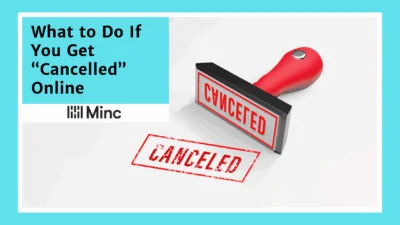
- Originally Published on September 17, 2025
What to Do If You Get Cancelled Online
Online “cancellation” has become a defining feature of the digital era. Whether it takes the form of viral social media posts, coordinated review attacks, or widespread calls for boycotts, cancel culture can have a profound impact on both individuals and businesses.
Some cancellation events are driven by legitimate concerns. Others spread false allegations, misleading narratives, or private information that should never have been made public. Regardless of the cause, the results can be severe. Clients frequently come to us after losing business opportunities, being harassed online and offline, or seeing their reputations permanently damaged in search results.
At Minc Law, we have handled hundreds of high-stakes reputation crises, from false social media campaigns to coordinated attacks on executives, entrepreneurs, and public figures. We focus exclusively on internet defamation, online harassment, and digital reputation protection, which means we know exactly how these attacks spread and how to stop them.
The most urgent question most clients ask is simple: is this illegal, and can anything be done about it?
When Online Cancellation Becomes Illegal
Not every criticism online is unlawful. The law protects free speech, including harsh opinions and even unpopular but truthful statements. However, many cancellation campaigns cross the line into illegal territory.
Cancellation may become unlawful when it involves:
- Defamation (libel or slander): False statements of fact that harm your reputation. This includes fabricated accusations of criminal conduct, fraud, harassment, or unethical behavior.
- Online harassment or cyberstalking: Repeated, targeted attacks meant to intimidate or cause distress, sometimes including coordinated pile-ons.
- Doxxing: Publishing private information such as home address, workplace, or phone number, often with the intent to encourage harassment.
- Non-consensual intimate content: Sharing or threatening to share private images or videos without consent.
- Copyright infringement: Using your original photos, videos, or writings without permission to harm you, which may justify a Digital Millennium Copyright Act (DMCA) takedown request.
- Fake review campaigns: Posting coordinated false reviews to harm your business’s reputation or mislead consumers.
- Invasion of privacy: Public disclosure of sensitive private facts, including medical records or confidential communications.
When cancellation involves any of these actions, you may have legal remedies available. In our experience, early intervention is crucial. A timely cease-and-desist letter, preservation of evidence, or takedown request can prevent an incident from escalating into a lasting reputational crisis.
Legal Thresholds & Burden of Proof
Before pursuing legal action, it is important to know what must be proven in court or in negotiations with platforms. This avoids wasting time and resources on cases that are not legally actionable.
For defamation claims, for example, you must generally be able to prove:
- A false statement of fact was made about you or your business.
- The statement was published or communicated to a third party.
- The statement caused actual harm to your reputation, finances, or relationships.
- The statement is not privileged and cannot be defended as opinion or fair comment.
If you are a public figure or limited-purpose public figure, you may also have to prove actual malice, meaning the statement was made knowing it was false or with reckless disregard for the truth.
The same principles apply to other claims as well. Harassment must generally involve repeated, targeted conduct that would cause a reasonable person substantial emotional distress. Review fraud claims require evidence that the reviews are false and connected to a competitor, disgruntled ex-employee, or other bad actor.
Because these standards can be nuanced, it is critical to consult an experienced internet attorney before taking action. Setting realistic expectations at the outset ensures that efforts are focused on claims with a strong chance of success.
How to Respond to Cancellation
Once you understand that the conduct may be unlawful, the next step is to respond quickly and strategically. Emotional or impulsive reactions often make the situation worse, so we recommend the following methodical approach:
Pause and evaluate the situation thoroughly. Begin by identifying exactly what is being said about you and where. Collect links, screenshots, and copies of all posts, comments, reviews, and articles. Determine which statements are true, which are opinion, and which are demonstrably false.
Preserve evidence before it disappears. Online content can be deleted or altered quickly. Save posts, videos, reviews, and messages along with date and time information.
Protect your privacy and accounts. Make personal social media accounts private if appropriate, enable two-factor authentication, and remove personal information from data broker websites to reduce the risk of doxxing.
Consult counsel before responding publicly. In some cases, remaining silent prevents additional attention. In others, a clear and narrowly crafted statement can prevent further misinformation. Legal guidance is essential to avoid unintentionally admitting liability or escalating the situation.
Take legal and technical action. If unlawful content is involved, our attorneys can send cease-and-desist letters, issue DMCA takedown notices, coordinate directly with platforms for expedited removals, unmask anonymous perpetrators through subpoenas, and, when warranted, file defamation or harassment lawsuits to obtain damages and injunctive relief.
Long-Term Reputation Recovery
Stopping the immediate harm is critical, but it is only the first step. After the cancellation event subsides, a reputation recovery strategy can prevent lasting damage. We typically recommend:
- Removing or suppressing harmful content where possible.
- Publishing accurate, positive material to restore balance in search results.
- Implementing ongoing digital risk protection monitoring to detect future attacks quickly.
- Rebuilding legitimate online reviews to counteract previous review fraud.
- Pursuing damages when appropriate to deter repeat offenders.
Common Questions From Our Clients
Is cancel culture illegal?
Not by itself. Criticism, boycotts, and opinions, even if harsh, are generally protected forms of speech. However, cancellation becomes unlawful when it involves false factual allegations, coordinated harassment, doxxing, extortion, copyright infringement, or other conduct that violates state or federal law. In those cases, you may be entitled to have the content removed and to seek damages.
Can I sue for being cancelled?
Yes, if you can meet the legal requirements for a claim. Most often, this means proving that false statements of fact were made about you, that those statements were published to others, and that they caused harm to your reputation, finances, or relationships.
How long does cancel culture backlash last?
Some viral incidents fade in days. Others persist for months or even years, especially if articles, posts, or videos remain visible in search results. Acting quickly can dramatically shorten the lifespan of a cancellation campaign and reduce its long-term impact.
Should I make a public statement?
It depends on the situation. A clear and factual response can correct misinformation, but an emotional or poorly worded statement can prolong the news cycle and exacerbate the situation. An attorney or crisis communications professional can help determine whether a statement is advisable and, if so, craft one that does not create additional liability.
What if some of the criticism is true?
You can still take action against false statements, harassment, and unlawful conduct. It may also be appropriate to address legitimate concerns constructively to help rebuild trust. Legal counsel can help you separate what is actionable from what may require a reputational or public relations response.
How much does it cost to stop online cancellation?
Costs vary depending on the scope and severity of the attack. Takedown requests and demand letters are typically less expensive and may resolve matters in a few weeks. Litigation or extensive forensic work may take longer and require a greater investment. We discuss costs and strategy with clients upfront so there are no surprises.
Take Control of Your Reputation
Online cancellation can have lasting personal and professional consequences, but you are not without options. By preserving evidence, securing your online presence, and acting quickly with the guidance of experienced legal counsel, you can stop unlawful attacks and begin the process of restoring your good name.
Call Minc Law at (216) 373-7706 or contact us using the form below for a free, confidential case review. Our attorneys are prepared to act within twenty-four to forty-eight hours to remove harmful content, stop harassment, and protect your reputation.
Get Your Free Case Review
Fill out the form below, and our team will review your information to discuss the best options for your situation.
This page has been peer-reviewed, fact-checked, and edited by qualified attorneys to ensure substantive accuracy and coverage.



